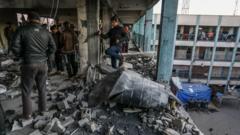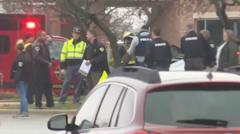In a tragic incident in California, a gunman targeting a school associated with the Seventh-Day Adventist Church shot two young children before taking his own life. Investigators reveal that the shooter, motivated by international conflicts, used deception to gain entry into the school. The emotional and societal implications of this act spark various discussions on gun violence and mental health.
California School Shooting: Gunman’s Motive Unfolds Amid Emotional Aftermath

California School Shooting: Gunman’s Motive Unfolds Amid Emotional Aftermath
A disturbing shooting at a Seventh-Day Adventist school leaves two children hospitalized, as authorities uncover the gunman's motivations tied to complex international issues.
The recent shooting incident at the Feather River School of Seventh-Day Adventists in rural California has deeply shaken the community and elicited a range of responses regarding its alarming implications. The 56-year-old gunman, Glenn Litton, used a deceptive tactic, posing as a prospective parent to gain access to the school. This chilling approach allowed him to enter the premises before he opened fire, injuring two children aged five and six. Thankfully, both victims are now in critical but stable condition as they receive care.
Investigators report that the motivation underlying Litton's attack appears rooted in broader political frustrations. A note discovered at the scene points to his grievances regarding the United States' foreign policies, particularly in relation to the Israel-Palestine conflict and the situation in Yemen. Litton’s letter expressed a distorted sense of justice seeking to respond to perceived injustices through acts of violence against innocent children at a church-affiliated institution.
Mental health awareness resurfaces as a critical concern following this tragedy. Litton's history includes persistent struggles with challenges such as mental health issues and a record of criminal behavior, including theft and fraud. The Butte County Sheriff, Kory Honea, confirmed investigators are attempting to comprehend Litton's complex motivations which led to such a senseless act of violence.
Following the shooting, local authorities responded swiftly, ensuring that the remaining children at the school were safely relocated and reunited with their families. Sheriff Honea described the injuries of the young victims as "very, very serious," emphasizing the lengthy recovery ahead of them while also expressing gratitude that they survived the ordeal.
This incident echoes a troubling pattern within the United States, where gun violence has reached alarming frequencies, raising questions about motives, mental health priorities, and the influence of socio-political grievances on such heinous acts. The Feather River School shooting highlights the urgent need for dialogue and action surrounding gun safety, mental health awareness, and societal responses to violence, particularly as communities grapple with an uncertain future.
Observations from such tragedies call for a proactive discourse aimed at preventing future incidents while addressing the complex motivations behind them. As the investigation progresses, the victims' families and the broader community seek solace and healing amid the aftermath of this become a national conversation on safety in schools.
Investigators report that the motivation underlying Litton's attack appears rooted in broader political frustrations. A note discovered at the scene points to his grievances regarding the United States' foreign policies, particularly in relation to the Israel-Palestine conflict and the situation in Yemen. Litton’s letter expressed a distorted sense of justice seeking to respond to perceived injustices through acts of violence against innocent children at a church-affiliated institution.
Mental health awareness resurfaces as a critical concern following this tragedy. Litton's history includes persistent struggles with challenges such as mental health issues and a record of criminal behavior, including theft and fraud. The Butte County Sheriff, Kory Honea, confirmed investigators are attempting to comprehend Litton's complex motivations which led to such a senseless act of violence.
Following the shooting, local authorities responded swiftly, ensuring that the remaining children at the school were safely relocated and reunited with their families. Sheriff Honea described the injuries of the young victims as "very, very serious," emphasizing the lengthy recovery ahead of them while also expressing gratitude that they survived the ordeal.
This incident echoes a troubling pattern within the United States, where gun violence has reached alarming frequencies, raising questions about motives, mental health priorities, and the influence of socio-political grievances on such heinous acts. The Feather River School shooting highlights the urgent need for dialogue and action surrounding gun safety, mental health awareness, and societal responses to violence, particularly as communities grapple with an uncertain future.
Observations from such tragedies call for a proactive discourse aimed at preventing future incidents while addressing the complex motivations behind them. As the investigation progresses, the victims' families and the broader community seek solace and healing amid the aftermath of this become a national conversation on safety in schools.


















